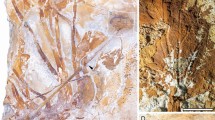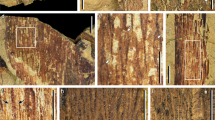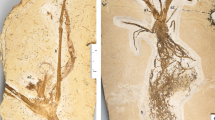Abstract
SMALL leaves and a leafy shoot from the Low Westphalian B (Upper Carboniferous) near Wakefield, Yorkshire, represent the oldest direct evidence for the existence of the order Coniferales (conifers) yet discovered. This material is preserved both as compression fossils and as charcoal.
This is a preview of subscription content, access via your institution
Access options
Subscribe to this journal
Receive 51 print issues and online access
$199.00 per year
only $3.90 per issue
Buy this article
- Purchase on Springer Link
- Instant access to full article PDF
Prices may be subject to local taxes which are calculated during checkout
Similar content being viewed by others
References
Florin, R., Palaeontographica Abt-B., LXXXV, 1–4, 1–241 (1939).
Moore, R. C., Elias, M. K., and Newell, N. D., J. Geol, XLIV, 1, 1–31 (1936).
Bharadwaj, D. C., Neues Jb. geol. Paläontol Mk., 11, 512–525 (1954); The Palaeobotanist, 12, 1, 18–27 (1963); Fortschr. Geol. Rheinld. U. Westf., 12, 45–54 (1964).
Harris, T. M., Proc. R. Soc. Lond., B 147, 289–308 (1957); J. Ecol., 46, 447–453 (1958).
Author information
Authors and Affiliations
Rights and permissions
About this article
Cite this article
SCOTT, A. The earliest conifer. Nature 251, 707–708 (1974). https://doi.org/10.1038/251707a0
Received:
Issue Date:
DOI: https://doi.org/10.1038/251707a0
This article is cited by
-
Early-Middle Permian palynoflora of Shandong Province, eastern North China
Journal of Palaeogeography (2020)
-
Geochemical Evidence of First Forestation in the Southernmost Euramerica from Upper Devonian (Famennian) Black Shales
Scientific Reports (2019)
-
Implications of fossil conifers for the phylogenetic relationships of living families
The Botanical Review (1999)
-
Resin diterpenoids as tracers for biomass combustion aerosols
Journal of Atmospheric Chemistry (1994)
-
Basic features of gymnosperm systematics and phylogeny as evidenced by the fossil record
The Botanical Review (1984)
Comments
By submitting a comment you agree to abide by our Terms and Community Guidelines. If you find something abusive or that does not comply with our terms or guidelines please flag it as inappropriate.



